#refugee athletes
Explore tagged Tumblr posts
Text
#refugees#refugee athletes#paris olympics 2024#sports#france#paris#south sudanese runner perina lokure nakang#migration#global issues
4 notes
·
View notes
Text


#imane khelif#cindy ngamba#olympics paris 2024#paris 2024#Olympics#refugee olympic team#athletes#lesbian#cameroon#lgbt#xx chromosomes#woman
356 notes
·
View notes
Text
#tiktok#refugees#refugee olympic team#olympics#olympics 2024#paris 2024#paris france#Paris Olympics 2024#Paris Olympics#athletes#refugee crisis
33 notes
·
View notes
Photo

15 notes
·
View notes
Text
I want more people to know that while the Palestine Olympic team consists of only 8 athletes, at least 69 Palestinian Olympic athletes have been killed since October 2023. This includes athletes who were going to compete in these games and retired athletes such as Majed Abu Maraheel, the first Palestinian Olympian, who died of kidney failure in a refugee camp product of lack of medical treatment.
Remember them during these games.
75K notes
·
View notes
Text
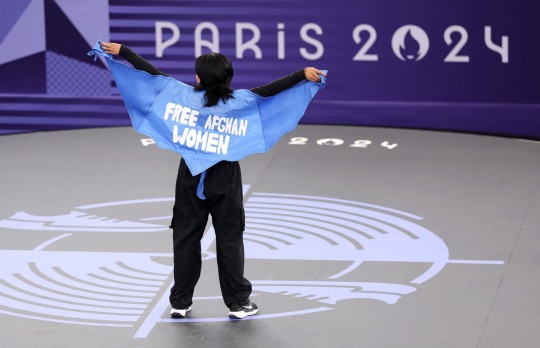
PARIS, Aug 9 (Reuters) - Afghan female athlete Manizha Talash, a member of the refugee Olympic team at the Paris Games, displayed the words "Free Afghan Women" on her cape during her breaking routine in the competition's pre-qualifiers on Friday.
Political slogans and statements are banned on the field of play and on podiums at the Olympics, meaning Talash could face a potential sanction.
source
713 notes
·
View notes
Text
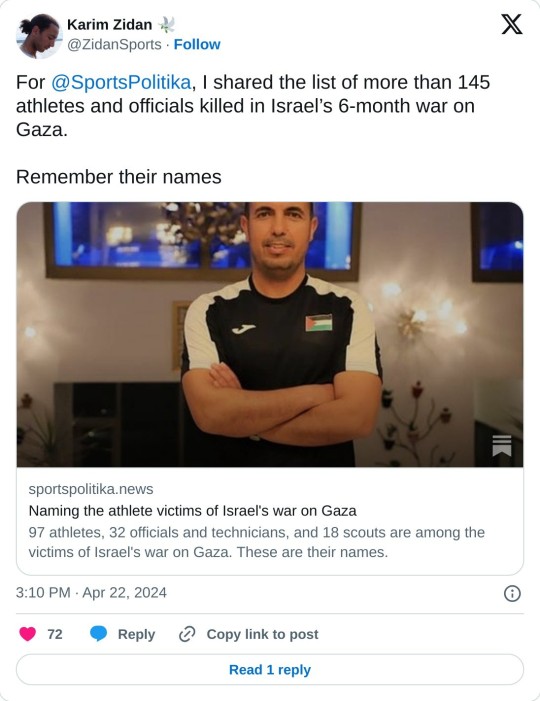
On Monday, April 15, the Palestinian Football Association announced that three children from the Al-Wahda Sports Academy had been killed during Israeli raids in Deir al-Balah, located in the heart of the Gaza Strip. “We announce the martyrdom of players Sami Bilal Abu Issa and Muhammad Bilal Abu Issa,” Al Wahda Academy announced on its Facebook account, which followed up by announcing the death of Adam Ramez Nabhan in another Israeli bombing. “Our hearts break for their loss.” The three children—the youngest of whom was was four years old, with the other two aged six—are among the hundreds of Palestinian athletes who have been killed since the war broke out between Israel and Hamas on October 7, 2023. Later that same day, the PFA revealed that at least 182 athletes and sports officials had been killed amid Israel’s destruction of Gaza, including no less than 28 children. An overwhelming number of the athletes killed were members of Gaza’s once vibrant football ecosystem. Among the notable names is Hani Al-Masdar, a former player and manager of the Olympic team, and Mohammed Barakat, Gaza’s first centurion of goals and a former national team player known as the “Legend of Khan Younis.” Israel has also destroyed or partially dozens of football facilities in Palestine since the start of the war. These include all of Gaza’s professional football stadiums, as well as the PFA headquarters, which was also targeted by Israeli airstrikes. Meanwhile, smaller facilities and dirt pitches have been transformed into makeshift refugee camps, field hospitals, and mass graves.
You can find the entire list of athletes murdered or injured by Israel in link above
#yemen#jerusalem#tel aviv#current events#palestine#free palestine#gaza#free gaza#news on gaza#palestine news#news update#war news#war on gaza#gaza genocide#genocide#football#footballer#soccer#athletes#palestinian athletes
350 notes
·
View notes
Text
giving a shoutout to Manizha Talash

she was the breaking athlete for team refugee, but originally is from afghanistan.
in this interview she says:
"I'll compete for my friends and for their dreams and hopes" "The girls of Afghanistan will never surrender. Whatever pressure you put on an Afghan girl - restrict her, or even imprison her - she'll definitely find a way out and will definitely achieve her goals. We fight and we will win."
wishing you luck in the future Talash!
179 notes
·
View notes
Text
I kind of love the implication that Leon Marchand just walked all the way to the stadium with the little lantern with the Olympic Flame.
Oh. And having the representative athletes from the five continents (Europe, Asia, Africa, Australia, and the Americas which get lumped together for Reasons) + the refugee team blow out the flame to end the games was so good, symbolically.
234 notes
·
View notes
Text
Queer and trans folk around the world often take an interest in the athletes from our community, and Outsports even collects a database of all the the out LGBTQ competitors. While JK Rowling and 99 percent of conservative media were harassing two cis women boxers, 195 QT athletes represented 26 nations and none, but we’ll get to that. That makes this the queerest Olympics ever, beating out the total of 186 out athletes in Tokyo and, if Queer Nation granted citizenships, would be the 14th largest national contingent at the games. That hypothetical Queer Nation would also have placed sixth in the medal count, tying the Netherlands with 15 golds but falling neatly between the Dutch and host country France on the strength of silvers and bronzes.
One happy bit of news is that in both golds and overall medal count, Queer Nation beat out every single country in the world that criminalizes same-sex boinking. The only bad news seems to be that people competing in the men’s events seem a little underqueered compared to the women. Can’t we at least get a few interested in the Greco-Roman wrestling? Yr Wonkette is just asking.
...
Sure, justice in silver and gold for badass bisexual Black woman Sha’Carri Richardson, excluded from Tokyo on the basis of smoking legal weed in Eugene, Oregon, was as sweet as sativa; it was fun to see Diana Taurasi go out on the queer top with her sixth Olympic gold in a row (team USA’s eighth consecutive women’s basketball gold); and seeing the shoulders on those women rugby players was a dream come true. But we want to speak about someone who didn’t represent any country at all: Cindy Ngamba.
Ngamba is a middleweight (75kg) boxer originally from Cameroon. At 11 years old some family members fled to the United Kingdom as refugees, and brought Ngamba along. The family maintains it had the proper approval for Cindy, but that when her uncle returned to Cameroon it was lost. The UK Home Office has been threatening to deport her since the age of 16, when she was accepted to university and realized she couldn’t produce her visa for her college paperwork.
Despite the threats, Ngamba fought and won many times in the UK’s amateur boxing competitions, having started as a hobbyist in the local Bolton Lads and Girls Club program. She also went on to get an undergraduate degree with honors, all while threats of deportation hung over her head. After winning a UK national championship, she met then-PM Theresa May celebrating her win and the efforts of the Lads & Girls Club where she trained. One might think that the UK might eventually forgive an 11-year-old girl for not keeping track of her paperwork herself, but the Home Office has remained resolute denying Ngamba regularized status.
What makes all this both horrifyingly inhumane and also relevant to this article is that Ngamba is an out lesbian. She has been consistently denied a path to citizenship or even legal residency, only escaping deportation because of her ability to document horror after horror inflicted on queer residents of Cameroon. International law prohibits sending a refugee back to their nation of citizenship or previous residence if they would face persecution and risk of great harm, a crime called “refoulement.”
“If I was sent back, I can be in danger,” Ngamba said. “So, I was given the refugee status to be safe and protected."
Unable to represent the UK and unable to compete in qualifying competitions in Cameroon, Ngamba got an opportunity that no other stateless athlete had ever shared before 2016: she was named to the IOC Refugee Olympic Team. So far that team has only been allowed to compete in the summer games, and only in Rio, Tokyo, and this year in Paris. (They will be allowed to compete in the Winter Games for the first time in 2026.) Given the incredible barriers most refugees face, it is perhaps not surprising that no Refugee Team member has ever won a medal. But while Ngamba has faced incredible legal problems and a ruthlessly anti-immigrant government her entire time in the UK, she at least had better training facilities in her local Lads & Girls than most refugees can dream.
And the dreams paid off. Team Refugee got its first medal ever when Ngamba took home middleweight bronze. "I just want to tell every refugee out there, whether they are an athlete or not, to never give up,” she said after being asked to carry the Olympic flag at the opening of the games. When she won, the whole refugee team took to the internet to celebrate:
“The Refugee Olympic Team is incredibly proud of Cindy Ngamba, the first EOR athlete and the first-ever refugee medallist at the Olympics,” the team posted on X, formerly Twitter. “Today, we are speechless. Cindy did it. Refugees did it!”
Yes, yes you did.
149 notes
·
View notes
Text
0 notes
Note
girl give us the eriss lore
oh my god I'm answering this so late (Emma check your inbox challenge level impossible)
For those of u who don't know; this is Eriss ↓
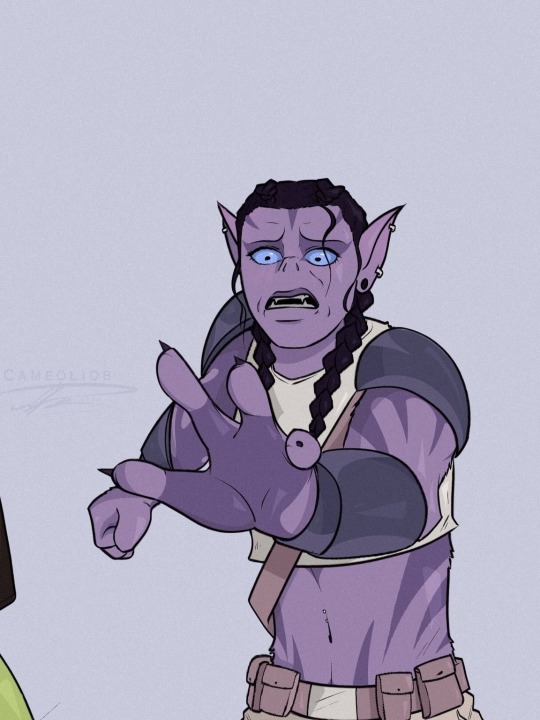
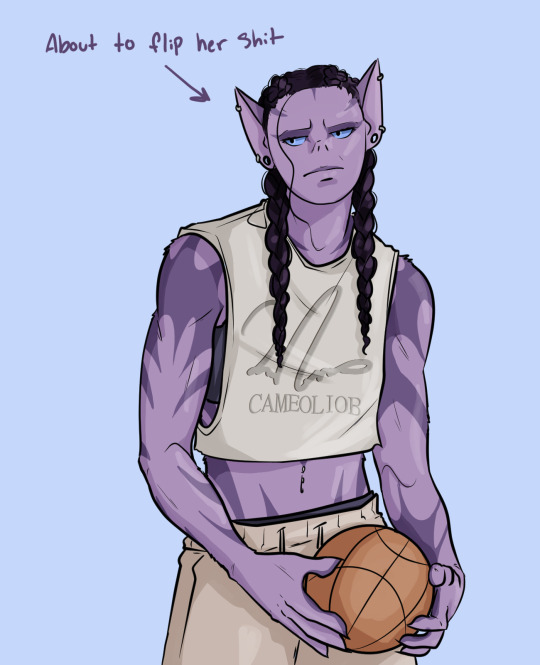
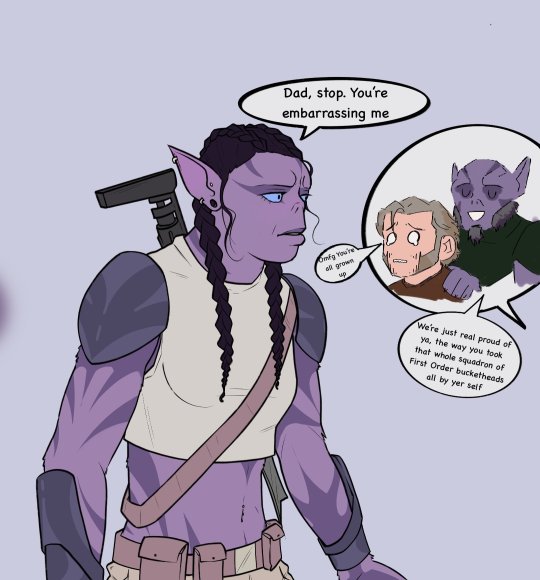
And she's my lil Kalluzeb kiiidddd
HERES THE LOREEEE
So, it's 3 ABY when the Ghost Crew gets a tip about some lasat refugees, and when they arrive they find two elderly grandparents and a three year old little girl named Eriss.
And this little girl just adores Zeb. Her grandpa suggests that it's because Zeb reminds her of her father, who'd been murdered alongside her mother by the empire. And Zeb can't help but love her back.
Once they get to Lira San, Chava quickly takes it upon herself to get the small family aquainted with the planet, and The Ghost Crew heads back to the Rebellion.
As the years go by, Eriss' grandparents pass peacefully of old age and she's placed with Chava. Its a temporary solution; Chava's old and-- as much as she would like to-- she can't keep up with the energetic little girl, but it would have to work for the time being.
But sometimes Zeb calls, just to check up on things, and she gets to hear all the stories about the rebellion, and the adventures that he goes on, and she loves it.
And then the war ends and Zeb comes back to Lira San.
And Eriss is fucking HYPED. She doesn't really like grown ups all that much but Zeb is fun as hell and now he can tell Eriss all his war stories in person, and it'll be so great and-- Who the fuck is that guy
Eriss had never met Kallus in person because he wasn't apart of the original mission that brought her and her grandparents to Lira San (damn intelligence mission got in the way). Zeb had mentioned him before in passing, but putting a face to the name was weird. Really weird.
She didn't mind it, though. He was nice-- not as cool as Zeb, but he was nice.
It takes some time, but eventually Chava brings up the idea of Zeb and Kallus taking Eriss in; as stated before, she's getting old and she cannot keep up with this six year old. Kal and Zeb are hesitant, of course, they didn't really plan to raise a kid but... realistically it would probably be what's best for Eriss in the long run so... they agree
And for all that hestation they really are the dads of all time

She's midly confused and it's a whole lot of getting used to, but by the time she's ten she's calling them Adan and Dad
So she grows up with two war heroes as parents who teach her everything they know ANNNDDDD she gets a Cousin (which... is kind of a curse. Is Jacen one of her best friends? Yes. Is he also her nemisis and rival? Also yes.) (average cousin experience)
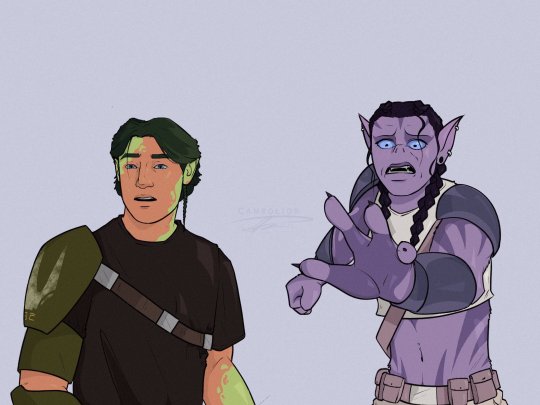
^ Top ten photos taken moments before disaster (they accidentally set Chopper on fire)
And sure she ended up with her Dads smart mouth, and her Adan's brashness, (a combonation resulting in what some may call attitude issues (all in good fun, of course)), but life is good. She's well read, she's educated, she's a student athlete (grav-ball point gaurd, and 3 time collegiate wrestling champ), her family is fire, she is truly living la vida loca

But then the First Order rolls around and she has to deal with all that bullshit but yk what, families who fight fascist regimes toegther stay together

#id also like to point out that i purposefully made her look kinda like a bat (esp. in the pic of her w the basketball)#and I think that I kind of cooked there#star wars#rebels#swr#star wars OC#agent Kallus#alexsandr kallus#kallus#garazeb orrelios#kalluzeb#OC#Eriss Kallus-Orrelios
105 notes
·
View notes
Text
#tiktok#refugees#refugee olympic team#olympics#athletes#amir rezanejad#iranian#iran#paris france#paris 2024#Paris Olympics 2024#paris olympics#olympics 2024
13 notes
·
View notes
Text

הצביעות האולימפית שוברת שיאים! למשלחת הישראלית לא אישרו אפילו סיכת חטופים כי זה מסר פוליטי מבחינתם, הם גם פסלו ספורטאית פליטה מאפגניסטן כי הניפה מסר למען חופש לנשים האפגניות שתחת דיכוי אבל הם אישור למשלחת הספורטאים הפלסטינים ללבוש בטקס הפתיחה חולצות עם ציור של מטוסים משגרים טילים כמחאה על הלחימה בעזה. פשוט לא ייאמן... מה שבטוח אנחנו נזכור מהאולימפיאדה הזו את ההישג המטורף של נבחרת ישראל, ולגבי הצביעות הבלתי נתפסת של הוועד האולימפי- מגיע להם לקבל מדליית הזהב בצביעות...
It’s shameful that the Olympics disqualified refugee athlete Manizha Talash, from Afghanistan, for wearing a cape reading “Free Afghan Women”, and the Olympic committee refuses to allow Israeli athletes to wear a hostage pin, but none of the Palestinian athletes were disqualified for wearing shirts with bombs on them at the Opening ceremony.
136 notes
·
View notes
Text
Usually held in the two weeks after the Olympic Games in the same host city, the Paralympics showcase the best athletes with physical disabilities from around the world competing for their home countries. (The Paralympics are not to be confused with the Special Olympics, which feature athletes with intellectual disabilities.) This year, the Summer Paralympics will take place from August 28 to September 8 in Paris, France.
Quick history lesson: The origins of the Paralympics began shortly after World War II, during the 1948 London Olympics, where 16 wheelchair-using veterans participated. The first official Paralympic Games took place in Rome in 1960 and featured 400 athletes from 23 countries. Since then, the Games have taken place every four years and now feature 4,400 athletes in 22 sports (the Olympics have 32), with 549 gold medals up for grabs.
There are athletes competing from 177 countries (this year’s Olympics had athletes from 184 countries), including 10 countries that have never been represented in the Paralympic Games before, along with representation from the Neutral and Refugee teams. In case you missed it, at the last Paralympics in Tokyo, China earned the most medals, with Great Britain behind it and the US in third.
Since the 1988 Summer Games and the 1992 Winter Games, the Olympic and Paralympic Games have been held in the same cities and venues. Although Paralympians still strive for equal treatment as Olympic athletes without disabilities, there is a large gap in funding between the Olympics and Paralympics.
Where to Watch
This year’s Games will make history as the first Paralympic Games to offer live coverage of every one of the 22 sports played. Like the Olympics, every event at the Paralympics will be available to stream on Peacock if you’re in the US.
If you prefer going old school and watching on basic cable, a select number of events will be airing on the NBC channels NBC, CNBC, and USA Network, along with E!, Golf Channel, and Telemundo, which offers coverage in Spanish. In an effort to make the Games more accessible, closed captioning will be available for every Paralympic event (regardless of the platform). You can also watch highlights and athlete interviews on Paralympic.org.
In the UK, Channel 4 has more than 1,300 hours of live coverage scheduled. Folks can also watch through their streaming service or Channel 4 Sport’s YouTube channel, which will show the entirety of the Games for the first time. BBC, BBC Radio 5 Live, and the BBC Sport website will also air highlights and select coverage. The Paralympics website also has a complete list of where to watch by country.
Opening Ceremony
The Opening Ceremony will begin August 28 at 8 pm Paris time, 7 pm BST, 2 pm EDT, and 11 am PDT. Similar to the Olympics opening ceremony, the Paralympics opening ceremony will be held outside of a stadium at one of the major squares in Paris, Place de la Concorde, and the iconic avenue Champs-Élysées will be transformed into the opening ceremony stage.
The competition starts the following day, on August 29, at 11 am EDT (8 am PDT). Like with the Paris Olympics, the start times will be similarly early and continue throughout the day. The specific timing of some of the events might change, so check the schedule of events on the Olympics' Paralympics schedule webpage.
Blind Football (Soccer)
Blind football is an adaptation of football (or soccer, if you’re American) for athletes with vision impairment played with an audible ball. This men’s competition starts early on September 1 and continues on September 2, 3 and 5, with the gold medal match on Saturday, September 7.
Boccia
Boccia is one of only two sports with no Olympic equivalent. It was originally created for athletes in wheelchairs who have impaired motor function or coordination. To win, each team must get the most balls closest to the white ball called the jack, with athletes allowed to make modifications according to their needs. Men’s and women’s individual games start August 29 and go through September 1, with the gold medal individual matches on September 1 and 2. Mixed pairs and teams start September 3, with gold mixed pairs and teams matches on September 5.
Goalball
The other sport of the Paralympic Games without an Olympic equivalent, goalball is a team sport for the visually impaired and blind, in which players wear special black eye-covering-type glasses so they fully can’t see and are thus more equitable (and honestly, look cool as hell). If there’s anything that the Olympic Games have taught us, it’s that the people go crazy for some out-of-the-norm eyewear. The audience needs to stay as quiet as possible because the ball has bells inside. Thus, the athletes have to rely solely on sound, while they use their whole body to try to block the ball from making it inside the goal. (Lets see Neymar try to do that.) Men’s and women’s games start August 29 with the gold medal games for both on September 5.
Para Archery
The first game played at the early iteration of the Paralympics in 1948, para archery now has men and women’s individual and mixed teams, with wheelchair or standing, and with recurve and compound bows used. Men’s and women’s individual events begin August 29 and continue through September 5, with gold medal matches in individual, teams and with different bows across multiple days.
Para Athletics
One of the most beloved sports in the Paralympics is para athletics, which has been a popular fixture in the games since the inaugural Rome Games in 1960. Today, it spans a wide range of track, jumping, and throwing events, as well as marathons. Because of the wide range of men’s and women’s events, competition begins on August 30 and happens daily with gold medal matches until the Games end on September 8. Check the full para athletics schedule for more specific events’ times.
Para Badminton
Para badminton debuted at Tokyo 2020, although it has been hugely popular for decades. Like badminton, players compete as singles and pairs, as well as standing and in wheelchairs. Group play begins on August 29, with men’s, women’s, and mixed doubles beginning August 31. Gold medal matches take place September 1 and 2.
Para Canoe
The Paralympic Canoe competition features two types of boats: the kayak and va’a (traditionally used in Oceania for travel between islands). Para canoes are basically the same as those used in the Olympic Games, but just have a wider bottom for greater stability. The races begin September 6 with gold medal games on September 7 and 8.
Para Road Cycling
Throughout the years, like many other events, Paralympic cycling has grown to adapt to many disabilities, and uses standard bicycles, handcycles, tricycles, and tandems. In road cycling, there are road races, time trials, and relay events. Both the men and women’s individual and relay events and gold medal races take place daily September 4 through 7.
Para Track Cycling
Para track cycling is similar to road cycling but takes place on a velodrome track (as the name suggests). Competition is divided into time trials, individual, and tandem or team sprints, using standard bicycles and tandems (all of which can be adapted for the specific athlete). The various track cycling events and gold medal races take place simultaneously August 29 to September 1.
Para Equestrian
Unlike the three equestrian events at the Olympic Games, the Paralympic equestrian program only includes the dressage competition. Para dressage essentially focuses on how well the rider and horse gel, with riders judged on their riding and performance with the horse. All the events are individual mixed, and each competition has gold medal rounds, taking place August 3, 4, 6 and 7.
Para Judo
Para judo is one of two martial arts competitions at the Games. The Paralympics judo follows the same rules as its Olympic equivalent, except it’s practiced exclusively by athletes with vision impairments—and is way more badass, in my humble opinion. (I think I’m allowed to make that assertion since I’m also disabled, don’t come for me.) With the athletes unable to see their opponent, they must use their sense of touch and careful listening—including slight differences in breathing and movement—to sense what their rival may do next. Men’s and women’s matches take place September 5, 6, and 7 and have gold medal matches at the end of each day.
Para Powerlifting
Para powerlifting is a men’s and women’s bench press competition that tests upper body strength where the athletes compete in different weight categories. All of the events are individual and there are gold medal rounds for each competition (which varies by gender and weight class) taking place September 4 to 8.
Para Rowing
A relatively new sport, rowing debuted at the Paralympic Games in 2008. Now, there are five rowing events, including three mixed events. Para rowing rules are nearly identical to those at the Olympics and rowers are eligible for different events according to their gender and impairment categories. The races begin across all categories on August 30, continue to August 31, with final gold medal rounds on September 1.
Para Swimming
Para swimming has remained one of the most enduring sports in the Paralympics since its debut at the Rome Games in 1960. Its popularity is due in part because athletes with all kinds of physical and mental disabilities can participate and doesn’t require any specific equipment. (Prosthetics aren’t allowed either.) Featuring different swims at different distances, athletes compete in breaststroke, backstroke, butterfly, freestyle, and medley. As one of the most popular sports, there are men’s, women’s, and mixed events virtually nonstop with gold medal races near the end of every day, August 29 until September 7.
Para Table Tennis
One of the OG Paralympian games, table tennis actually has a longer history in the Paralympic Games than its Olympic counterpart. When it began, it was only open to wheelchair users, although today athletes are placed into 11 different classes based on their physical and intellectual impairments. Men’s and women’s doubles, singles and mixed games take place August 29 to September 7, with gold medal games every day except September 2.
Para Taekwondo
Para taekwondo is a new competition that made its Paralympic debut at the Tokyo Games. Focused on athletes with upper limb impairments, they are split into two sports classes and divided into weight categories. Men and women compete August 29 to 31, with gold medal matches at the end of each day.
Para Triathlon
A relatively new sport introduced at the 2016 Rio Games, the para triathlon is held over the “sprint” distance, which is half the Olympic distance for individual competitions, where athletes swim 750 meters, cycle 20 kilometers, and run 5 kilometers. The competition is divided by men’s and women’s, with medals being awarded for each race September 1 and 2.
Shooting Para Sport
Shooters compete in rifle and pistol events from distances of 10-meter, 25-meter, and 50-meter in men’s, women’s, and mixed fields. Depending on needs, athletes compete in a kneeling position, prone, or standing (or in a wheelchair or shooting seat). The games take place August 30 to September 5, with medals awarded each day.
Sitting Volleyball
Sitting volleyball is pretty much the exact same as the volleyball we know and love, except as the name suggests, is a sitting variation of the sport. It’s played by two teams of six players who move around the court using the power of their arms, along with a lowered net that’s 3 feet high. The games start on August 29 and continue until the men’s gold medal game on September 6 and the women’s on September 7.
Wheelchair Basketball
Originally used for rehabilitation and exercise for World War II veterans—wheelchair basketball is quintessential Paralympics. Now, it’s one of the most popular and beloved sports for wheelchair users around the world. Games start August 29 and go until the men’s gold medal match September 7, with the women’s September 8.
Wheelchair Fencing
What’s more badass than fencing? Wheelchair fencing. In this sport that requires discipline (and ability to not flinch when a sword is coming at you), athletes compete in a special wheelchair frame designed for the sport which is fastened to the floor—meaning the fencers cannot move and are always close to their opponent. Just like the Olympic equivalent, wheelchair fencing consists of three disciplines: foil, épée, and saber. The men’s and women’s matches take place September 3 to 7, with gold medal rounds at the end of every day.
Wheelchair Rugby
Wheelchair rugby is a four-person team sport played in specially designed wheelchairs. It combines elements of rugby, basketball, and handball, with players using a round ball. Because it’s such an aggressive sport, it’s often referred to as “murderball.” Need I say more? You’re gonna wanna watch this one. Mixed games start August 29, with the gold medal games September 2.
Wheelchair Tennis
Wheelchair tennis pretty much follows the same rules of able-bodied tennis, except here the ball can bounce twice before the player hits it back. Athletes are divided into open and quad classes, along with men’s, women’s, singles, and doubles. Games start August 30, with gold medal matches September 4 to 7.
91 notes
·
View notes
Text




Cindy Ngamba (Britain-based Cameroonian boxer) has guaranteed herself an Olympic medal! and the first ever for the Refugee Olympic Team after winning her quarter-final match against France’s Davina Michel.
“It means the world to me, to be the first ever refugee to win a medal,” Ngamba said. “I’m just a human, just like any other refugee, athlete and refugee all around the world. But I hope I can change the medal on my next fight.
“I was fighting a very tough opponent today. A lot of people were not cheering for me. But I listened to my team, I listened to my coaches and I listened to my own self. I stuck to the tactics and I stayed calm and composed. I’m happy that I got the job done. Hopefully in the next one, I will also get the job done. No, not hopefully. I will get it done.”
Ngamba told reporters. “I want to say to all the refugees around the world ... keep on working hard, keep on believing in yourself.”
For those not familiar with how boxing works, it’s one of the few sports that gives out two bronze medals.
#cindy ngamba#olympics#paris 2024#refugee olympic team#equipe olympique des réfugiés#hope she goes all the way!
59 notes
·
View notes